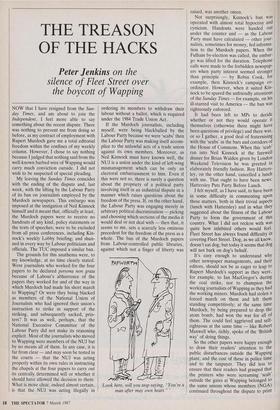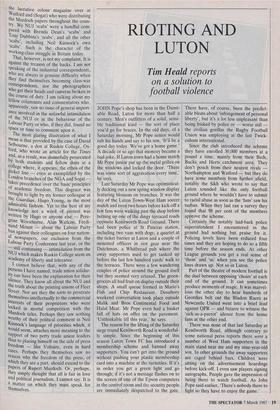THE TREASON OF THE HACKS
Peter Jenkins on the
silence of Fleet Street over the boycott of Wapping
NOW that I have resigned from the Sun- day Times, and am about to join the Independent, I feel more able to say something about the recent dispute. There was nothing to prevent me from doing so before, as my contract of employment with Rupert Murdoch gave me a total editorial freedom within the confines of my weekly column. However, I chose to say nothing because I judged that nothing said from the well-known barbed wire of Wapping would carry much conviction outside. I did not wish to be suspected of special pleading.
My leaving the Sunday Times coincides with the ending of the dispute and, last week, with the lifting by the Labour Party of its ban on journalists employed by the Murdoch newspapers. This embargo was imposed at the instigation of Neil Kinnock himself and it meant that, officially at least, the Murdoch papers were to receive no handouts of any kind, policy statements or the texts of speeches; were to be excluded from all press conferences, including Kin- nock's weekly Lobby briefing; and shun- ned in every way by Labour politicians and officials. The TUC imposed a similar ban.
The grounds for this anathema were, to my knowledge, at no time clearly stated. Were journalists who worked for the four papers to be declared persona non grata because of Labour's abhorrence of the papers they worked for and of the way in which Murdoch had made his short march to Wapping? Or were they being blacked as members of the National Union of Journalists who had ignored their union's instruction to strike in support of the striking, and subsequently sacked, prin- ters? It was as well, perhaps, that the National Executive Committee of the Labour Party did not make its reasoning explicit. Most of the journalists who moved to Wapping were members of the NUJ but by no means all of them. In any case, it is far from clear — and may soon be tested in the courts — that the NUJ was acting properly within its own rules in instructing the chapels at the four papers to carry out its centrally determined will or whether it should have allowed the decision to them. What is more clear, indeed almost certain, is that the NUJ was acting illegally in ordering its members to withdraw their labour without a ballot, which is required under the 1984 Trade Union Act.
If the Murdoch journalists, including myself, were being blackballed by the Labour Party because we were 'scabs' then the Labour Party was making itself accom- plice to the unlawful acts of a trade union against its own members. Moreover, as Neil Kinnock must have known well, the NUJ is a union under the kind of left-wing mismanagement which can be only an electoral embarrassment to him. Even if this were not so, there is surely a question about the propriety of a political party involving itself in an industrial dispute in a manner which raises questions about the freedom of the press. If, on the other hand, the Labour Party was engaging merely in arbitrary political discrimination — picking and choosing which sections of the media it would deal or not deal with — then that, it seems to me, sets a scarcely less ominous precedent for the freedom of the press as a whole. The ban of the Murdoch papers from Labour-controlled public libraries, against which not a finger of liberty was `Look here, will you stop saying, "You're a man after may own heart." ' raised, was another omen.
Not surprisingly, Kinnock's ban was operated with almost total hypocrisy and cynicism. Handouts were handed out under the counter and — as the Labour Party must have calculated — other jour- nalists, sometimes for money, fed informa- tion to the Murdoch papers. When the Fulham by-election was called, the embar- go was lifted for the duration. Telephone calls were made to the forbidden newspap- ers when party interest seemed stronger than principle — by Robin Cook, for example, then Kinnock's campaign co- ordinator. However, when it suited Kin- nock to be spared the unfriendly attentions of the Sunday Times — for example, on his ill-starred visit to America — the ban was righteously enforced. It had been left to MPs to decide whether or not they would operate it themselves (otherwise there might have been questions of privilege) and there was, or so I gather, a good deal of fraternising with the 'scabs' in the bars and corridors of the House of Commons. When this 'scab' ran into Neil Kinnock at the farewell dinner for Brian Walden given by London Weekend Television he was greeted in elaborately friendly fashion. Roy Hatters- ley, on the other hand, cancelled a lunch with me. That ought to have been news: Hattersley Puts Party Before Lunch. I felt myself, as I have said, to have been in some difficulty in commenting upon these matters, both in their trivial aspects (lunch with Hattersley) and in what they suggested about the fitness of the Labour Party to form the government of this country. What I did not reckon with was quite how inhibited others would feel. Fleet Street has always found difficulty in covering Fleet Street. Dog, as we all know, doesn't eat dog; but today it seems that dog will not bark on dog's behalf.
It's easy enough to understand why other newspaper managements, and their editors, should not be as eager to leap to Rupert Murdoch's support as they were, for example, to Ian MacGregor's during the coal strike, nor to champion the working journalists of Wapping as they had the working miners. Murdoch had stolen a forced march on them and left them standing competitively; at the same time Murdoch, by being prepared to drop the atom bomb, had won the war for all of them. The could feel aggrieved and self- righteous at the same time — like Robert Maxwell who, richly, spoke of the 'British way' of doing things. So the other papers were happy enough to draw their readers' attention to the public disturbances outside the Wapping plant, and the cost of these in police time and to the taxpayer. They did less to ensure that their readers had grasped that the printers who were screaming 'scab' outside the gates at Wapping belonged to the same unions whose members (NGA) continued throughout the dispute to print the lucrative colour magazine over at Watford and (Sogat) who were distributing the Murdoch papers throughout the coun- try. We NUJ 'scabs' were a handful com- pared with Brenda Dean's 'scabs' and Tony Dubbins's 'scabs', and all the other scabs', including Neil Kinnock's own scabs'. Such is the character of the working-class struggle in Britain today. That, however, is not my complaint. It is against the treason of the hacks. I am not speaking of the industrial correspondents, who are always in genuine difficulty when they find themselves becoming class-war correspondents, nor the photographers who get their heads and cameras broken in the course of duty. I am talking about my fellow columnists and commentators who, apparently, saw no issue of general import- ance involved in the unlawful intimidation of the NUJ or in the behaviour of the Labour Party or who, if they did, found no space or time to comment upon it. The most glaring illustration of what I mean is that provided by the case of David Selbourne, a don at Ruskin College, Ox- ford, who wrote an article for the Times and, as a result, was shamefully persecuted by both students and fellow dons at a college where, it appears, the ethos of the picket line -- even as exemplified by the London branches of the NGA and Sogat - takes precedence over the basic principles of academic freedom. This disgrace was brought to light by my former colleague at the. Guardian, Hugo Young, in the most admirable fashion. Yet to the best of my knowledge not a word of protest was written by Hugo or anyone else — Pere- grine Worsthorne, Alan Watkins, Ferdi- nand Mount — about the Labour Party ban against their colleagues on four nation- al newspapers, our exclusion from the Labour Party Conference last year, or the — still continuing — intimidation from the NUJ which makes Ruskin College seem an academy of liberty and tolerance. I cannot believe that, with any of the persons I have named, trade union solidar- ity can have been the explanation for their silence. They know all about the NUJ and the truth about the printing unions of Fleet Street. Nor are they the sorts to prostrate themselves intellectually to the commercial interests of their proprietors who were locked in mortal competition with the Murdoch titles. Perhaps they saw nothing worthy of their political comment in Neil Kinnock's language of priorities which, it would seem, attaches more meaning to the support of two petty trade union leaders than to placing himself on the side of press freedom — like Voltaire, even in hard cases. Perhaps they themselves saw no reason why the freedom of the press, of which they are a part, should extend to the papers of Rupert Murdoch. Or, perhaps, they simply thought that all is fair in love and political journalism. I cannot say. It is a matter on which they must speak for themselves.



























































 Previous page
Previous page